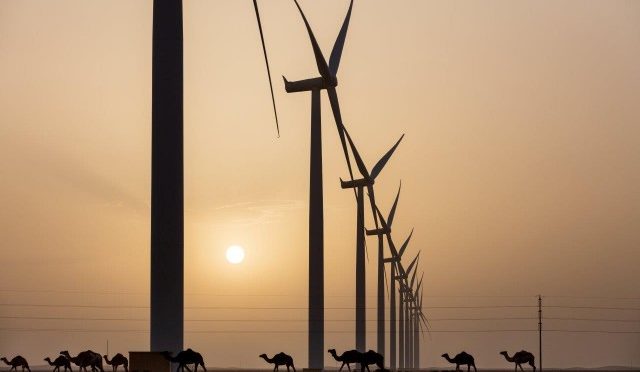Siemens Gamesa Renewable Energy has received a firm order for the supply of wind turbines to the consortium between Nareva and Enel Green Power for the Boujdour wind farm, located in southern Morocco, with a total capacity of 301 MW.
The Boujdour wind farm is part of the 850 MW tender in Morocco (Projet Éolien Intégré) awarded to the consortium in 2016. The firm order includes the supply, transport, installation, commissioning and testing of 87 SG 3.4-132 wind turbines and a 5-year service contract. The project is expected to enter service in the third quarter of fiscal 2022.
Spanish wind power operator Siemens Gamesa is hoping to reach an energy production capacity of one gigawatt (GW) in Morocco in the near future, Sonia Adnane, Siemens Gamesa’s head of communications and public affairs in Africa, told Morocco World News.
“Today, we have 180 megawatts under construction in Midelt, as … part of the 850MW framework agreement in partnership with the National Electricity Office (ONEE). In that context, we are very much looking forward to starting the next ones, helping us to reach more than 1GW in the country,” Adnane said.
Siemens Gamesa, present in Morocco since 2017, currently operates eight wind farms across Morocco, totaling 856 MW and representing over 72% of the local market share.
The wind farms are located in Tarfaya (301MW), Aftissat (201MW), Tangier (140MW), Essaouira (60MW), Foum el Oued (50MW), Haouma (50MW), Tetouan (32MW), and Laayoune (5MW).

Photo provided by Siemens Gamesa Morocco.
In an interview with MWN, Adnane, who is also responsible for Siemens Gamesa’s corporate social responsibility in Africa, shared the company’s expansion ambitions in Morocco. She also touched on initiatives launched during the COVID-19 pandemic.
Siemens Gamesa in Morocco
The Spanish company expanded to Morocco in 2017 through the launch of a wind turbine blade factory in Tangier. The plant is the first of its kind in Africa and in the Middle East, Adnane revealed.
According to the executive, the production unit delivers blades to Morocco, Europe, Africa, and the Middle East.
Siemens Gamesa currently employs approximately 800 people in Morocco, including 750 in the Tangier factory and around 50 in its Casablanca-based commercial office.
The company is one of the main partners of Moroccan organizations operating in the field of renewable energies.

Photo provided by Siemens Gamesa Morocco.
“We are proud to be a partner of choice and can look up at some major achievements and projects in collaboration with our partners in the Moroccan wind energy market,” Adnane said.
“We aim to keep and strengthen these partnerships while continuing to develop technologies that will maximize the productivity of the wind source,” she continued.
The renewable energy expert expressed Siemens Gamesa’s wish to further expand in Morocco because the country offers “the best wind conditions” in the region.
“Whenever and wherever we will see opportunities, we are committed to accompany the country to reach its goals for a sustainable future in Morocco and for Morocco,” Adnane pledged.
COVID-19 impact
Like the majority of businesses across the world, Siemens Gamesa has sustained an impact from the COVID-19 pandemic. According to Adnane, the company recorded an 8.4% reduction in year-on-year revenues during the third quarter of 2020.
However, the organization’s “strong financial position,” in addition to its “strict health and safety protocols,” allowed it to mitigate some of the COVID-19 crisis’ repercussions.
“We applied new solutions to assure operations continue, including rerouting certain supply chains and optimizing remote monitoring,” the executive told MWN.
“In Africa and certainly in Morocco, we were able to keep our activities quite well on track,” she added, thanking the Moroccan government for its mobilization to support businesses.


